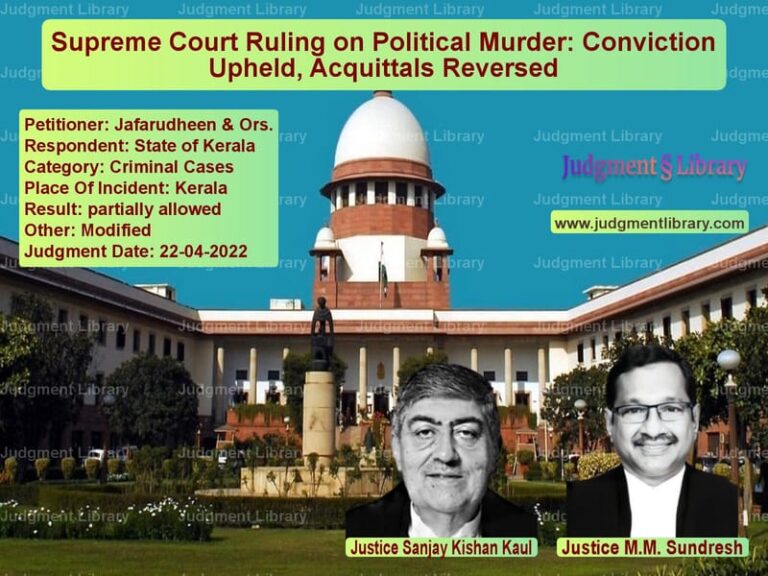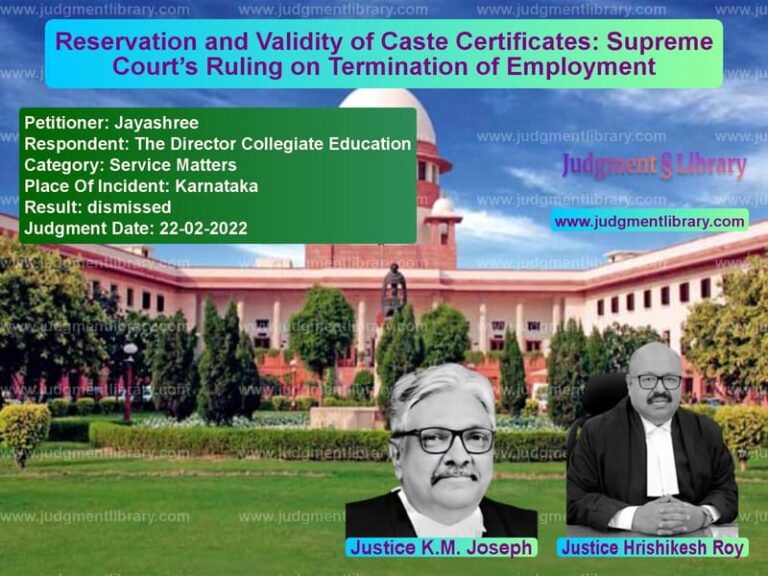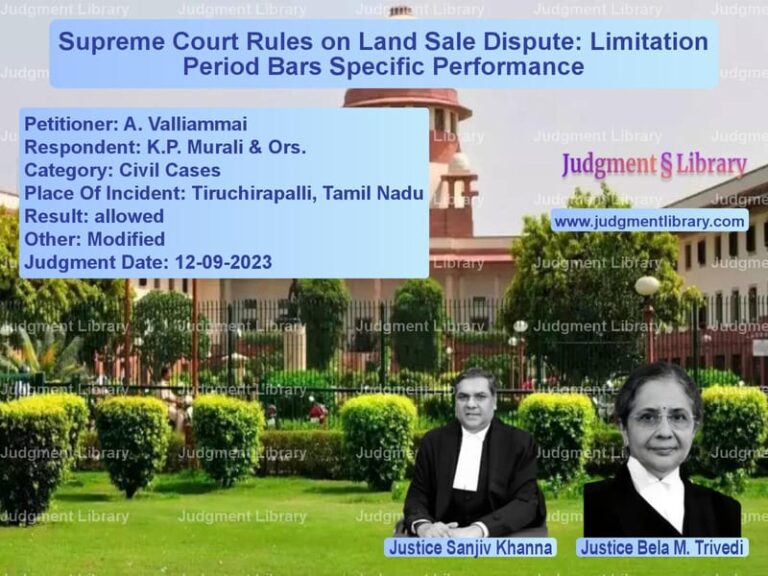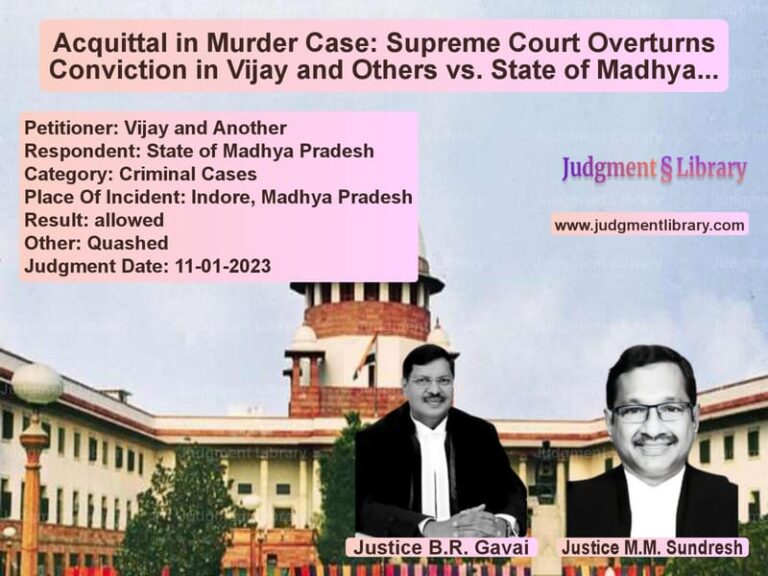Foreigners Tribunal Order Overturned: Supreme Court Rules in Favor of Assam Resident
The Supreme Court of India recently delivered a significant judgment in the case of Sirajul Hoque v. The State of Assam & Ors., setting aside the orders of the Foreigners Tribunal and the Assam High Court, which had declared the appellant a foreigner. The ruling underscores the principle that minor discrepancies in documents should not lead to an adverse decision on citizenship status.
Background of the Case
The case arose when the appellant, Sirajul Hoque, was declared a foreigner by the Foreigners Tribunal in Assam on January 19, 2017. The Tribunal found discrepancies in his grandfather’s name and noted that the appellant’s father and grandfather lived in different villages. Based on these observations, the Tribunal held that Hoque had failed to establish his Indian citizenship.
The appellant challenged this decision before the Gauhati High Court, which dismissed his petition, ruling:
“The petitioner failed to plead material facts about his identity as a citizen of India in his written statement before the Tribunal. The requirement of Section 9 of the Foreigners Act, 1946, places the burden of proof on the proceedee, which he failed to discharge.”
Following this, Hoque approached the Supreme Court, arguing that the Tribunal’s findings were erroneous and based on trivial inconsistencies in documents.
Arguments Before the Supreme Court
Petitioner’s Claims (Sirajul Hoque)
- The appellant produced several documents to prove his citizenship, including the voter list of his grandfather, Kematullah, from the village of Sotobashjani.
- The name discrepancy between “Kematullah” and “Kefatullah” was a clerical error and did not change the identity of the individual.
- Additional supporting documents included:
- NRC Registration details from 1971, listing his grandfather as Kefatullah.
- Voter lists in which his father’s name, Amtullah, appeared consistently.
- An Income Tax document from 1981 showing his PAN number.
- Photo identity cards issued by the Election Commission of India.
- Identity cards and voter lists that included his brother’s name.
- The appellant contended that the Tribunal’s decision to treat his father’s relocation to another village as a factor against him was arbitrary and unjust.
Respondents’ Arguments (State of Assam & Others)
- The burden of proof under Section 9 of the Foreigners Act, 1946, rests on the appellant to establish his Indian citizenship beyond doubt.
- The inconsistencies in names raised questions about the authenticity of the documents presented.
- The Tribunal had examined the records and found that the appellant failed to conclusively link himself to an Indian lineage.
Supreme Court’s Observations
The Supreme Court critically examined the evidence and found that:
- The name variation from Kematullah to Kefatullah was minor and did not warrant the rejection of citizenship.
- The father’s name Amtullah was consistently recorded across documents, reinforcing the appellant’s lineage.
- There was no doubt about the family’s continuity in India based on voter lists and NRC records.
- The Tribunal and High Court had failed to consider the cumulative weight of evidence.
The Court stated:
“This being so, the grandfather’s identity, father’s identity, etc., have been successfully established by the appellant. Further, the mere fact that the father may later have gone to another village is no reason to doubt this document.”
Final Verdict
The Supreme Court ruled in favor of the appellant and set aside the orders of the Foreigners Tribunal and the Gauhati High Court. The key directions were:
- The appellant was to be released from detention immediately.
- He was recognized as an Indian citizen based on the documents provided.
Key Takeaways
- Burden of Proof in Citizenship Cases: While the Foreigners Act places the burden on the individual, tribunals must assess evidence fairly and holistically.
- Importance of Minor Name Variations: Clerical errors in historical records should not lead to adverse rulings on citizenship.
- Role of Documentary Evidence: A combination of voter lists, NRC records, and other government-issued documents should be considered in determining citizenship.
- Judicial Protection Against Arbitrary Expulsions: The Supreme Court’s ruling ensures that procedural fairness is upheld in citizenship cases.
Conclusion
The Supreme Court’s decision in this case is a landmark ruling on the rights of individuals facing citizenship disputes in Assam. It reinforces the principle that minor clerical errors should not be grounds for declaring a person a foreigner, thereby protecting genuine Indian citizens from wrongful exclusion.
Petitioner Name: Sirajul Hoque.Respondent Name: The State of Assam & Ors..Judgment By: Justice Rohinton Fali Nariman, Justice Vineet Saran.Place Of Incident: Assam.Judgment Date: 14-02-2019.
Don’t miss out on the full details! Download the complete judgment in PDF format below and gain valuable insights instantly!
Download Judgment: Sirajul Hoque vs The State of Assam & Supreme Court of India Judgment Dated 14-02-2019.pdf
Direct Downlaod Judgment: Direct downlaod this Judgment
See all petitions in Fundamental Rights
See all petitions in Constitution Interpretation
See all petitions in Public Interest Litigation
See all petitions in Judgment by Rohinton Fali Nariman
See all petitions in Judgment by Vineet Saran
See all petitions in allowed
See all petitions in Quashed
See all petitions in supreme court of India judgments February 2019
See all petitions in 2019 judgments
See all posts in Constitutional Cases Category
See all allowed petitions in Constitutional Cases Category
See all Dismissed petitions in Constitutional Cases Category
See all partially allowed petitions in Constitutional Cases Category







